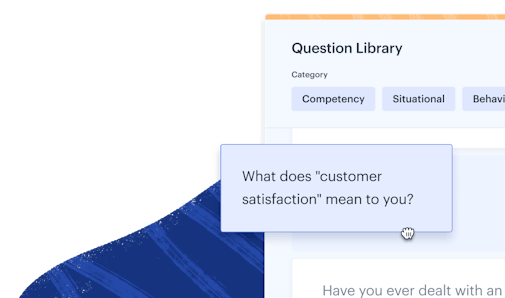23 Customer Service Interview Questions (+ Interview Tips)


How can you tell if that smart and eager customer service candidate will be an engaged and productive team member? Short of inventing a time machine, there’s no guaranteed method, which makes your interview one of the most important tools you have to vet customer service and support candidates.
The right interview questions reveal useful information because they force interviewees to think on their feet and draw on their experiences. Seeing how they react speaks volumes about how they will handle real-life situations — and will help you avoid wasting time and energy hiring the wrong person.
Download the ebook
Download this free guide by filling out the form below.

23 customer service interview questions to ask candidates
Ask every candidate the 23 customer service interview questions below to get the information you need to hire top talent.
1. How would you define good customer service?
2. What appeals to you about this role?
3. What’s the best customer service you’ve ever received? Why?
4. Can you tell me about a time when you received poor customer service?
5. Is there a difference between customer service and customer support?
The first five questions on our list help you find candidates who share your underlying beliefs about the role customer service plays in an organization. You know what you consider to be great service; does your candidate have the same high expectations?
Good candidates will be able to explain why customer service matters to a business and give clear examples of good and bad service. They should be prepared to talk about your specific company and how customer service might contribute to its success.
Watch out for people who really want a different role but see customer service as the easiest way to get a foot in the door. They’ll be less likely to have thought through what great customer service means to a business.
6. Can you tell me about a time when you were proud of the level of service you gave a customer?
7. Have you ever dealt with an unreasonable customer? How did you handle it, and how would you handle it today?
8. Have you ever bent the rules in assisting a customer? Tell me about the situation and the outcome.
9. In your past work, have you ever received negative feedback from a customer? What did you do with that feedback?
10. Can you tell me about a customer who you found difficult to understand and how you approached that interaction?
11. Can you describe a time when you had to say no to an important customer’s request?
12. What’s the best way to help a customer who has worked with multiple agents and hasn’t received the help they need?
Questions 6-12 measure candidates’ emotional intelligence, empathy, and reflectiveness. In the answers, you need to hear specific, true stories of past service experiences. Even a very junior candidate may have prior retail experience to draw from.
Good candidates will share detailed examples from their own experiences and will be able to answer follow-up questions about those examples. Look for people who show humility and take responsibility for their mistakes.
Watch out for people who give theoretical examples rather than real situations or who only provide examples where the customer or their colleagues were at fault.
13. Tell me about a time when a customer was reporting a technical issue that you didn’t know the answer to. What was your approach, and how did it end up?
14. Can you tell me about a situation with a customer when there wasn’t a clear policy to use and you needed to make a judgment call? How did you approach your decision, and what happened?
15. Can you give me an example of a situation where there were major problems with your product/service and you needed to respond without having all the answers yet?
Questions 13-15 measure a candidates’ ability to solve problems — an invaluable skill that can always be improved.
The best candidates will be able to walk you through their approach to situations where they didn’t immediately have an answer. Ask them for examples of how they learned from those situations and applied them to another problem.
Beware of people who claim never to have been stumped or who can only give examples where another team or colleague provided the final answer.
16. Can you give an example of how you handled alerting a customer when your product/service caused a major problem?
17. When responding to a customer, how do you decide what information to include and what to leave out?
18. Can you tell me about a time when you needed to convince a customer or teammate to change the way they were working (e.g., adopt a new procedure or modify their language) and how you went about doing so?
Questions 16-18 are designed to measure candidates’ communication skills. There’s no greater skill for customer service employees than the ability to communicate clearly and with the appropriate level of detail. This section is an opportunity for your best candidates to stand out by explaining how they talk or write to customers.
Great candidates will show an ability to interpret a customer’s needs and modify their communication styles for different audiences. Look out for candidates who can only describe a single communication approach; they may be too inflexible.
19. What’s the last new skill you learned? Why did you choose that skill, and how did you learn it?
20. Can you tell me about a time when you made a great contribution to your team?
21. What’s the next book I should read? Why?
22. What are you better at today than you were this time last year?
23. What do you think makes a good teammate?
The final five questions on our list are designed to measure candidates’ attitudes and approaches to work.
These questions give you an opportunity to understand what a candidate will be like to work with. Are they always looking to learn new skills? Will they be supportive of their colleagues as well as customers?
People who can talk about their interests and carry on a casual conversation typically perform well in a customer service role.
Tips for making the most of your support interviews
When interviewing potential support hires, you always run the risk of repeating the same questions, receiving the same answers, having the same small talk, and then promptly forgetting all the important details.
The antidote? Think creatively, establish a system, and then stick to it. You won’t be left groping for questions, your interactions will be more memorable, and you’ll be able to standardize the circumstances under which you assess candidates.
A strategic approach makes for less fuss, more focus, and leads to the best person possible joining your customer service team. Below, Cassie Marketos provides some useful tips for conducting better interviews.
Encourage candidates to use a storytelling approach
Great support reps possess an abstract set of skills that can be difficult to address head on. You need to find conversational side doors to draw these qualities out by asking questions that require a story to answer.
Sarah Judd Welch employs this tactic by inquiring about advocacy:
“I ask them to give an example of a time they advocated on behalf of someone else. I also ask for an example of a recent conflict and how it was resolved. I’m closely paying attention to how they describe the actions of others; you don’t want them to harshly blame anyone else, but objectively assess the situation and how they tried to resolve it.”
These questions encourage candidates to share a relevant on-the-job anecdote, but they also require them to tell a story in a coherent, narrative fashion.
Why is that subtext so important? Because you need to appraise their ability to break down complex ideas into relatable, easily understood steps; one of the most fundamental support skills. People can reveal a lot about their personal psychology by how they frame a story.
Reading between the lines, what do a candidate's stories say about their penchant for patience, their willingness to help, or their talents as a team player? Do all of their examples lead to someone else made a bad decision and that’s why didn't work?
Here are some good storytelling questions to get you started:
Tell me about a time when you were trying to convince somebody to do something. Give a specific instance and explain how you handled it.
Did your previous team ever have a project go completely awry? What went wrong? What was the final outcome? (Note: Leave out “What could you have done better?” to give them a chance to respond unasked or completely miss the opportunity.)
Describe a negative interaction you had in a customer service situation with a different company. What do you think they could have done differently to make it better?
Listen to how they listen
An active listener is a prepared problem solver. Instead of auto-piloting to a solution based on what they expect to hear, they’re patient enough to listen to how a customer feels and respond accordingly.
The same answer can be packaged in wildly different ways according to a customer’s temperament, and it’s important to know if your future teammate can adapt their tone.
You can tease this out during an interview by asking multi-part questions. If a candidate carefully addresses each point you’ve asked them to discuss, that means they’re an engaged and sincere listener. It’s also a good indication you’ve found somebody who will treat users well when they show up to talk to your company.
Try some of these examples:
What interests you about customer service, in particular? Where do you see this role taking you?
How did you hear about our company? Is there something specific that stands out to you about the product or team?
What’s a time you had to give somebody an answer they didn’t want to hear? Were you able to approach it in a way that resulted in an overall positive outcome? If so, how?
Throw a "zag" into your interviews
Boilerplate questions don’t reflect the reality of support. They surprise no one, they won’t surface an ability to thrive under pressure, and their limited framing begets limited answers. That’s no good, because you’re searching for creativity; work isn’t a multiple choice test.
Instead, complement your must-ask questions, your “zigs,” with a few questions that "zag."
Ask a question the candidate won’t know the answer to. How do they respond? When they’re new, they’ll face many questions in the queue that will leave them stumped.
Ask a question that has nothing to do with the product: “Who’s the most under-appreciated hero/heroine in any story? Why?” Is their response charming, or does it fall flatter then an "N/A" reply in a written interview?
Get people to commit with one question (“What are you a perfectionist about?”) and then dig deeper with a second (“When has this created conflict between you and someone else?”)
You can also zag by how you conduct interviews. I encourage managers to take potential support hires out for coffee. Observing how someone interacts with the outside world will speak volumes about their self-awareness and personal motivations.
A person who can’t be bothered to say “please” and “thanks” is not a person who should be in the business of professionally making other people happy.
Get real answers from references
References can be a valuable component of the interview process if handled correctly. Granted, it can be a challenge to have a forthright conversation with a person who has been hand-picked to deliver a glowing review, but the right attitude (and some good questions) will go far.
Help Scout alum Ivana Flodr has honed her technique down to a particularly revealing pair of questions. First, she asks a reference to rate a candidate from 1-10 in terms of living up to their potential. Most people will respond warmly (“A 9!”), but her follow-up coaches more candor into the dialogue: “How could they get to a 10?”
The question often lowers people’s guards and gets them talking about both a candidate’s shortcomings and their ability to improve. You’ll get honest feedback about a person’s trajectory and their commitment to self-improvement; information that’s hard to glean from anywhere else.
It’s also important to ask for specific anecdotes and to frame questions so they can’t be answered with a pat “yes” or “no.” For example, “What’s a time that this person resolved an intra-team conflict?” will get you a lot further than, “Do they work well with others?”
One chance to get it right
The tricky thing about interviews is you only have one shot to set the right tone and learn what you need. Even good candidates will struggle to shine in a bad interview.
The best interviews are not strict question-and-answer sessions; they’re structured conversations that draw out candidates’ attitudes, strengths, and challenges.
Try not to rush to fill the silence; it's okay to let your candidates sit quietly before they answer a question. It can give them time to formulate their thoughts, and it can also result in them revealing more than they initially intended.
It's also okay to ask similar questions at different points during the interview. Often, the best stories will come out when candidates have had a few minutes to think about an earlier question. By revisiting important areas, you give them the best chance to reveal their character and skills to you.
With a considerate process and clever questions in hand, you’ll own up to your end of the bargain and set the stage for candidates to reveal who they are, how they work, and if they’re the person you’ve been looking for.
If you are about to hire for a customer-facing role, save a ton of time using our free Customer Service Interview Builder. Drag & drop 60+ high quality, service-specific interview questions, edit or add your own, and export them ready for use.


